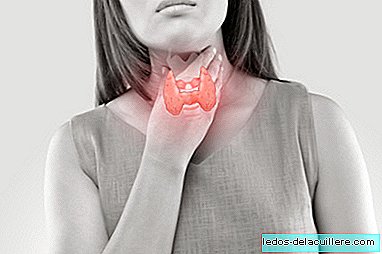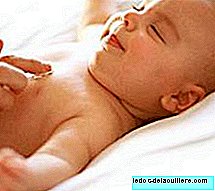
Problems in the thyroid gland can appear at any stage of life, also during pregnancy and postpartum. When these alterations occur in the following months after giving birth, we will be talking about "postpartum thyroiditis", a autoimmune disease in which the woman's antibodies attack the thyroid, causing an alteration in the production of thyroid hormones.
Among the multiple symptoms caused by this disease would be those of hyperthyroidism and hypothyroidism. We tell you in detail how "postpartum thyroiditis" affects health and how it is treated.
What is postpartum thyroiditis?
Postpartum thyroiditis is an autoimmune disease that causes inflammation of the thyroid gland. It is estimated that affects one in 20 women after giving birth, and the symptoms appear in the first 12 months after delivery.
The exact reason for this alteration is unknown, although genetic and environmental factors could intervene. In addition, it has been seen that patients with other diseases such as type 1 diabetes, psoriasis or vitiligo have an increased risk of developing thyroiditis, as well as those who have previously suffered from thyroid dysfunction.
The disease consists of two phases, although not all women with postpartum thyroiditis suffer from the complete picture. Some only cross the hyperthyroid phase and others only the hypothyroid phase.
In the first phase hyperthyroidism appears, that is, an excessive production of hormones. This phase usually lasts between two and four months, and normally It occurs between the first and sixth month after giving birth.
In a second phase, hypothyroidism appears, in which the thyroid gland has been weakened and unable to produce enough hormones. This phase usually lasts between two and 10-12 months.
What are your symptoms?
The symptoms that appear in the hyperthyroidism phase are usually mild, and are manifested in the form of fatigue, weakness, sweating, weight loss, nervousness, irritability, problems falling asleep ...
In the second phase of hypothyroidism other symptoms appear as unexplained weight gain or inability to lose it, difficulty concentrating, cold, hair loss, dry skin, brittle nails, depression, tiredness, tingling in hands and feet ...

The main problem is that a large part of the symptoms caused by this disease can be associated with other postpartum and breastfeeding (tiredness, weakness, hair loss, dry skin ...), or even confused with postpartum depression, hence the patient sometimes takes time to consult with a doctor.
How is it treated?
Normally, no type of treatment is required in the first phase of the disease, and in the second one a thyroid hormone therapy is usually used until the gland function recovers.
The duration of treatment is usually between six and 12 months, and at this time most patients recover, although it is important to keep in mind that in a percentage of cases the disease could recur after new pregnancies.
Is the treatment compatible with breastfeeding?
As we can read on the e-lactation website, the treatment of hypothyroidism with replacement hormones is compatible with breastfeeding:
"The concentration in Liotironina (T3) breast milk is much higher than that of Levothyroxine (T4), which is usually very low or undetectable. Therefore, and because of more experience, Levothyroxine is more recommended than Liotironin for the treatment of hypothyroidism in general and during breastfeeding "
Recall, once again, the importance of going to periodic check-ups after childbirth, as well as consulting with the doctor all doubts or symptoms that may arise during postpartum, however "normal" we think it is what we are feeling.












